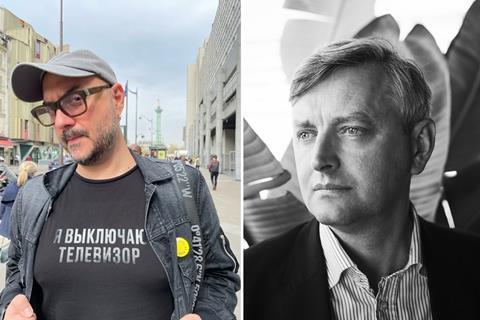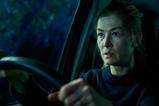
Cannes is one of the first – if not the first – major opportunity for the international cultural community to signal its intent following the Russian invasion of Ukraine in late February.
The inclusion of the now-exiled Russian director Kirill Serebrennikov’s film, Tchaikovsky’s Wife, in Competition at Cannes’ 75th edition, is a strong marker, and Sergei Losnitza in the Special Screenings section with The Natural History Of Destruction, is an even clearer sign. Cinema will not censor itself: blanket bans will not be countenanced, at least, if Cannes has anything to do with it. Now both directors will walk the red carpet while bombs fall at home (although born in Russia, Serebrennikov’s mother is Ukrainian). Cannes is handing them the mic.
Neither film will directly deal with the conflict. The iconoclastic, punky Serebrennikov, also a theatre director, has only recently escaped to Berlin from Moscow after two years (of a three-year) suspended sentence and travel ban for charges of embezzlement. Last year his Petrov’s Flu screened in Competition at Cannes but he was prevented from attending. Tchaikovsky’s Wife, repped by Charades, is a heightened domestic drama about the Russian composer and his wife set in 19th-century St. Petersburg.
Sergei Losnitza’s film, The Natural History Of Destruction, is another archive documentary from the Ukrainian director of Donbass and Maidan, who moves fluidly between fact and fiction and has been a regular at Cannes in all sections (Babi Yar. Context screened last year). Exploring the impact and legacy of the blanket Allied bombing of Germany in the latter days of the Second World War, it will have inescapable parallels with Russia’s bombardment of Ukraine.
But the appearance of these two giant filmmaking talents, in particular, united at the Palais Des Festivals, means even more than their films. Losnitza, who has tirelessly catalogued Russia’s encroachment on his native Ukraine, was expelled by the Ukrainian Film Academy in March for, in part, expressing support for dissident Russian filmmakers. There are other films from Ukraine in Official Selection, but Loznitsa and Serebrennikov together are meaningful and send a message to other festivals and events when it comes to a blanket boycott of Russian films.
Cannes, following a line taken by Berlin, Venice and other major A-list festivals, expressed itself clearly after the invasion of Ukraine. It would ban Russian delegations, and anyone linked to the Russian government, but did not expressly exclude individual, dissident filmmakers (nearly all Russian films are state-financed in some way, and these would be examined on an individual basis).
Festivals including Glasgow and Stockholm have followed the Ukrainian Film Academy’s call to exclude all films produced by the Russian Federation, but the situation is in flux. As Losnitsa said: “When I hear these calls to ban Russian films, I think of these [filmmakers] who are good people. They are victims as we are of this aggression.” At the same time, filmmakers on the frontline of a thuggish, murderous conflict, see that this is not the time for niceties, but to send clear signals.
Cannes has ensured the conversation will continue, and it will continue at Cannes, even if the war wages on, and worsens in so many ways. With 35,000 people accredited, and almost 2,000 press attending, this is an opportunity for debate that goes beyond showing two films.






























No comments yet